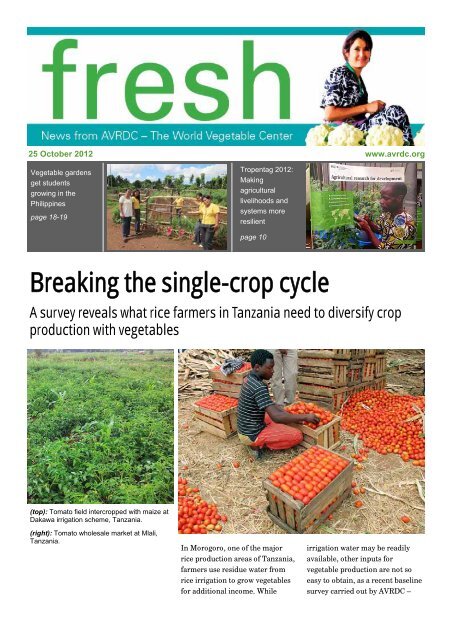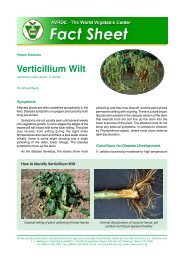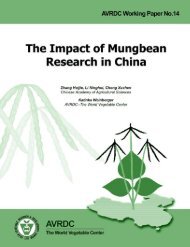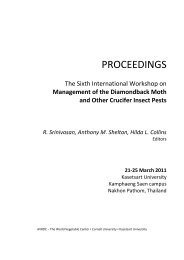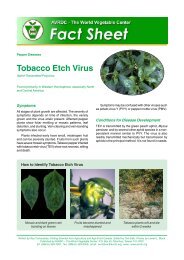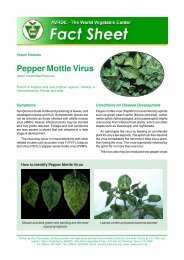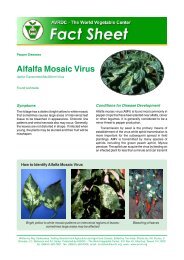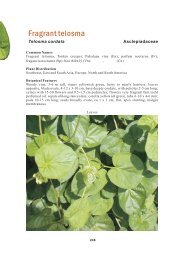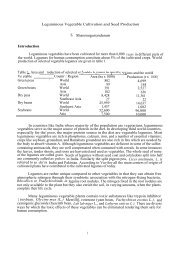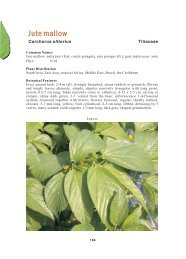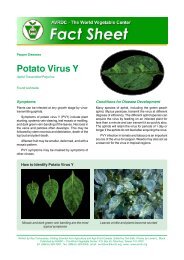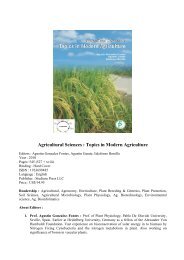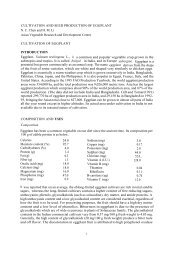AVRDC
AVRDC
AVRDC
- No tags were found...
You also want an ePaper? Increase the reach of your titles
YUMPU automatically turns print PDFs into web optimized ePapers that Google loves.
25 October 2012 www.avrdc.orgVegetable gardensget studentsgrowing in thePhilippinespage 18-19Tropentag 2012:Makingagriculturallivelihoods andsystems moreresilientpage 10Breaking the single-crop cycleA survey reveals what rice farmers in Tanzania need to diversify cropproduction with vegetables(top): Tomato field intercropped with maize atDakawa irrigation scheme, Tanzania.(right): Tomato wholesale market at Mlali,Tanzania. In Morogoro, one of the majorrice production areas of Tanzania,farmers use residue water fromrice irrigation to grow vegetablesfor additional income. Whileirrigation water may be readilyavailable, other inputs forvegetable production are not soeasy to obtain, as a recent baselinesurvey carried out by <strong>AVRDC</strong> –
2(...continued from page 1)Morogoro’s rice-based system,farmers will need better access tocredit and inputs such as fertilizerand seed of improved, high yieldingvarieties with better resistance topest and diseases. Extensionservices also must be strengthenedto provide farmers with a reliablesource of information on integratedcrop and pest managementpractices.Victor Afari-Sefa (2nd from left), <strong>AVRDC</strong> Socioeconomist based in Arusha, visits the tomatowholesale market at Mlali, Tanzania.The World Vegetable Center inMvomero and Kilombero districtsin Morogoro revealed.The survey, part of a project toenhance vegetable value chains inrice-based and sole crop productionsystems in Morogoro, identifiedconstraints to the production,marketing and consumption oftomato, pepper, and Africaneggplant. The survey also assessedcommon crop pests and diseases inthe area and the contamination ofvegetables on farms and in marketsby microbes, pesticides and heavymetals.According to Victor Afari-Sefa,<strong>AVRDC</strong> Socioeconomist based inArusha, the survey found that toboost vegetable production inThe survey identified the need tobuild more robust marketinginformation systems to openopportunities for farmers to accesslarger, more lucrative markets suchas supermarket chains and foodprocessors. Skills development isanother area in need of attention;Victor noted farmers would benefitfrom training in recordkeeping andbusiness management.Project enumerators interviewed237 farmers and 28 value chainparticipants, including seed andagro-input dealers, vegetablecollectors, wholesalers, retailers,traders and consumers. Thegreatest challenges facing vegetable(left): Field interviews during baseline socioeconomic survey.(right): Interview with a local stockist (seed and agrochemical dealer)in Mvomero district, Tanzania. (...continued on page 3)
3(...continued from page 2)(left): A team from the United States Agency for International Development mission visit during enumerator training involving staff from the AfricaRice Center, <strong>AVRDC</strong> - The World Vegetable Center, and students from Sokoine University of Agriculture.(right): Rice processing plant at Mlali, Tanzania. traders in Morogoro includeunpredictable markets, fluctuatingprices, lack of adequate tradingcapital, and the high cost oftransportation.As part of the project, staff andstudents of Sokoine University ofAgriculture (SUA) received trainingin protocols for detecting humanand plant pathogens in vegetables.The International Institute ofTropical Agriculture (IITA), AfricaRice Center, Sokoine University ofAgriculture, Tropical PesticidesResearch Institute (TPRI), OhioState University (OSU) and theDistrict Agriculture and LivestockDevelopment Office for Mvomeroand Kilombero are partners with<strong>AVRDC</strong> in the effort to promotevegetable production to raise ricefarmer incomes, and to encouragegreater consumption of vegetablesto improve the nutritional quality ofdiets. The Sugarcane ResearchInstitute (SRI) in Kibaha alsocollaborated on the project.(left): Tomato field cultivated with residual water fromharvested rice field at the Dakawa irrigation scheme.(right): A frustrated farmer showing a tomato plant producedfrom adulterated seed at Dakawa.
CORNUCOPIA4The Center in the newsForbes magazine used data from an <strong>AVRDC</strong> report inan article on rising rates of food waste in Europe andNorth America:http://www.forbes.com/In the Alberta, Canada Brooks & County Chronicle,the Center was credited with supplying mungbeanlines for Canada’s Crop Diversification Southinitiative.Dyno Keatinge’s visit toIndonesia (see page 7)was covered by theIndo Pos, InvestorDaily, and KoranJakarta newspapers.He also appeared on atelevision talk show,“Agropolitan TV.”
CORNUCOPIA5VisitorsLudwig Scotty (left), Speaker of Parliament, Nauru, accompaniedby members of Parliament Aloysius Amwano, David Adeang,and Baron Waqa; Executive Secretary Ann-Marie Thoma; andImran Scotty of the Nauru Police Force, made a brief visit to<strong>AVRDC</strong> headquarters on 8 October 2012. Yin-fu Chang, DeputyDirector General, Administration & Services, welcomed thedelegation and accompanied them on a tour of the DemonstrationGarden. Nauru, an island nation with a population of 9322, has oneof the highest rates of diabetes in the world; the parliamentarians areseeking ways to improve the diets and health of their people.A delegation from Shanghai, China learned about the Center’sresearch activities on 9 October 2012. Shiu-luan Lu,Communications & Information, briefed the visitors and Yu-hsiaHuang (left), Global Technology Dissemination, guided thedelegation through the Demonstration Garden.Ropate Ligairi (left), Permanent Secretary of the Fiji Ministry ofPrimary Industries, met with Director General Dyno Keatinge,Deputy DG for Administration and Services Yin-fu Chang, Directorof Human Resources I.R. Nagaraj, and Plant Pathologist andGlobal Theme Leader – Production Jaw-Fen Wang (center) on 15October 2012. <strong>AVRDC</strong> is providing seed for disaster relief to Fiji,and Secretary Ligairi would like to explore other areas ofcollaboration with the Center.Les Baxter (right), Research Program Manager-Horticulture and Principal Regional Coordinator-Papua NewGuinea and the Pacific for the Australian Centre forInternational Agricultural Research (ACIAR) spent a full dayat <strong>AVRDC</strong> headquarters on 18 October 2012 for discussionswith staff. He gave a seminar on a conceptual model for thecreation of public-private alliances in official developmentassistance programs. Public-private alliances can be goodvehicles for development in a range of sectors includingagriculture and health, but they vary greatly in the ability ofparticipants to freely enter into an alliance, choose partners,and select management and governance structures. Lescompleted his seminar with an overview of ACIAR’s Horticulture Program, which emphasizes integratedcrop production systems to move smallholders from subsistence to semi-commercial production. ACIARhas supported several <strong>AVRDC</strong> projects in Asia and the Pacific, and the strong partnership will continue asthe two institutions find more ways to work together.
CORNUCOPIA6SeminarsSheuechin “Jin” Shieh, Assistant Specialist, Pepper Breeding gave a talkon inheritance of heat tolerance in sweet peppers to colleagues atheadquarters on 4 October 2012. Temperature is the most crucial factoraffecting sweet pepper production; heat stress can inhibit root and shootgrowth, cause flowers to drop, reduce pollen viability, and reduce fruit weight.Jin is researching inheritance of heat tolerance traits to develop improvedscreening methods for heat stress and to design breeding strategies for sweetpeppers that can take the heat. Three additive genes appear to be involved foryield traits under heat stress; by combining heat tolerant components (e.g.root growth, pollen viability) from different lines, breeders may be able todevelop improved heat-tolerant sweet pepper.Shin-Jiun Vicky Cherng, Assistant Specialist, Bulb Alliums, discussedpropagation techniques for virus-free garlic bulbs in a seminar on 11 October2012. Viruses affect bulb quality and decrease yield; they also accumulate inplanting material. Strategies to produce healthy planting material includeselection of disease-free bulbs for propagation and tissue culture. Multiplyinggarlic via tissue culture of florets from emerging 1 cm-long scapes couldgenerate healthy garlic bulbils within one year, much quicker than shoot-tipculture.Roland Schaefleitner, Head, Molecular Genetics, gave a presentation on“Molecular markers: from SSRs to SNPs” on 18 October 2012 to headquarterscolleagues. Simple sequence repeats (SSRs) and single nucleotidepolymorphisms (SNPs) are DNA fragments found at certain locations in agenome. Roland explained how these landmarks are used to produce thegenetic maps plant breeders consult to associate phenotype with genotype,and to assess the interaction of genes governing traits such as yield or fruitsize, or those conferring heat or drought tolerance. Roland is currentlyworking on resistance gene mapping for tomato, pepper and mungbean,mutant screening in tomato, and embryo rescue after wide crosses.WelcomePatcharaporn (Joom) Suwor,Graduate Student from theDepartment of Plant Science andAgricultural Resources, Khon KaenUniversity, Thailand, will extend herinternship at <strong>AVRDC</strong> headquarters foranother six months, to 31 March 2013.Funded by the Royal Golden Jubilee Ph.D. Scholarship,Joom will continue her work on molecular markers foranthracnose resistance in pepper for her thesis entitled“Combining anthracnose resistant genes into hot peppervarieties” under the supervision of Sanjeet Kumar,Scientist – Pepper Breeding.Ayumu Onozato, ResearchIntern / Tomato Breeding, fromKAGOME Co., Ltd., ResearchInstitute, Japan, arrived at <strong>AVRDC</strong>headquarters on 10 October 2012 fora two-month internship to study fieldand laboratory methods for diseaseresistance screening in tomato under the supervision ofPeter Hanson, Plant Breeder.
CORNUCOPIA7<strong>AVRDC</strong> Director General visits Indonesia<strong>AVRDC</strong> Director General DynoKeatinge travelled to Indonesia forthe first time on 1-10 October 2012,accompanied by Kartini Luther,Assistant to the Deputy DirectorGeneral – Research and JokoMariyono, Project SiteCoordinator. Dr. Keatinge met withrepresentatives from the UnitedNations Centre for Alleviation ofPoverty through SustainableAgriculture (UN-CAPSA), and theIndonesian Ministry of Agriculturein Jakarta and Bogor to exploreopportunities for collaboration. At<strong>AVRDC</strong> project locations in Bali andEast Java he visited farmers andpartners to learn about thechallenges they encounter invegetable production, and at schoolshe encouraged students and teachersto consume balanced diets. The DGpromoted vegetables as a gateway toprosperity and health during anappearance on a talk show aired byAgropolitan TV in East Java. AtEast-West Seed Indonesia(EWINDO) headquarters inPurwakarta, Dr. Keatinge signed aletter of agreement with Dr. GlennPardede, Managing Director,establishing a plan for futuredistribution of vegetable seed kits inresponse to natural disasters inIndonesia. The United States Agencyfor International Development(USAID), EWINDO and <strong>AVRDC</strong>have prepared 10,000 kits, eachcontaining seed of five differentvegetable crops, growinginstructions, and tips for saving seedfor future planting.A revolution in diets for health throughvegetable consumption(top) Kartini Luther at billboard promoting horticulturein Bali.(below, clockwise from top left) DG Dyno Keatingein discussion with farmers at Tabanan, Bali; with GlenParede of EWINDO; with Katinka Weinberger of UN-CAPSA; at Plemahan Junior High School garden.
CORNUCOPIA8<strong>AVRDC</strong>: Nice at ICERamasamy was invited to give atalk on “How the use of integratedpest management for vegetablescontributes to food and nutritionalsecurity in Asia” in a symposiumorganized by Prof. ChristianBorgemeister, Director Generalof the International Centre of InsectPhysiology and Ecology (icipe –African Insect Science for Food andHealth). Srini also spoke on the“Effects of Maruca vitrata multiplenucleopolyhedrovirus on nontargetinsect pests and naturalenemies” in another symposium.(r to l): Srini Ramasamy, <strong>AVRDC</strong> Entomologist, Prof. Christian Borgemeister, DirectorGeneral of the International Centre of Insect Physiology and Ecology (icipe – African InsectScience for Food and Health) and Sopana Yule, Research Assistant (Entomology), <strong>AVRDC</strong> Eastand Southeast Asia.The XXIV International Congressof Entomology (ICE 2012) was heldAugust 19-25, 2012 in Daegu, SouthKorea, with more than 2500 paperspresented in several symposia.<strong>AVRDC</strong> Entomologist SrinivasanSopana Yule, Research Assistant(Entomology), <strong>AVRDC</strong> East andSoutheast Asia, also attended thecongress and delivered an oralpresentation on “Phanerotomaphilippinensis, a potentialparasitoid for managing legumepod borer, Maruca vitrata.” Thelatter two presentations were partof the vegetable legumes projectfunded by Deutsche Gesellschaftfür Internationale Zusammenarbeit(GIZ).Research scholar receives travel grantMalini Periasamy, a doctoralresearch scholar in <strong>AVRDC</strong>’sBiotechnology and MolecularBreeding group, was awarded atravel grant from the KirkhouseTrust, UK to attend theInternational Organization forBiological and Integrated Control ofNoxious Animals and Plants/WestPalaearctic Regional Section(IOBC/WPRS) conference on"Semio-chemicals: the Essence ofGreen Pest Control" in Bursa,Turkey from 1-5 October 2012.Malini is studying the populationdiversity and pheromone bindingproteins in legume pod borer,Maruca vitrata. She gave a talk onthe molecular-phylogeneticcharacterization of legume podborer populations and theimplications for pheromoneperception. The presentation waspart of the vegetable legumesproject funded by DeutscheGesellschaft für InternationaleZusammenarbeit (GIZ).
CORNUCOPIA9Horticulture expert to lead KU International Affairs<strong>AVRDC</strong> – The World VegetableCenter extends congratulations toPoonpipope Kasemsap on hisappointment as Vice President forInternational Affairs of KasetsartUniversity (KU), Bangkok,Thailand. Prior to his appointmentPoon was Chair of the HorticultureDepartment and Director of theInternational Studies Center. Hisresearch and teaching focuses onthe effects of climate change and airpollutants on the ecophysiology ofhorticultural crops and on thephysiology of horticultural cropproduction. He is a member of theInternational Advisory Board of theUSAID-supported HorticultureCollaborative Research SupportProgram (HortCRSP) together with<strong>AVRDC</strong> Director General DynoKeatinge.Read more:http://www.ku.ac.th/HR in East and Southeast AsiaNagaraj Inukonda, Director ofHuman Resources, visited <strong>AVRDC</strong>East and Southeast Asia inThailand from 10-11 October 2012to facilitate a team-buildingseminar for regional staff based inBangkok and the Research andTraining Station in KamphaengSaen. Joko Mariyono, who iscoordinating a USAID-fundedproject for the Center in Indonesia,also attended the seminar. Nagarajmet with participants of <strong>AVRDC</strong>'s31st International VegetableTraining Course, and encouragedthem to become ambassadors intheir home countries to promotevegetable production andconsumption.Tune into VegView!Always wanted to tryyour hand at graftingtomato, eggplant andcucurbits?Watch the instructionalvideos prepared byWillie Chen, <strong>AVRDC</strong>Global TechnologyDissemination andVanna Liu, Communications and Information, andyou’ll have the technique down pat in no time. View thevideos on:<strong>AVRDC</strong> website home pagehttp://avrdc.org<strong>AVRDC</strong> Alumni Registry now openAs the Centerprepares tocelebrate its 40thanniversary, wewelcome allformer membersof the <strong>AVRDC</strong>community to joinour AlumniRegistry. Staff, postdocs, interns: Tell us where you areand what you have been doing -- we would love to know!Throughout 2013 the Center will honor its alumni witharticles in Fresh, the <strong>AVRDC</strong> newsletter, along withchances to win commemorative prizes. Sign up today!http://avrdc.org/?page_id=3518<strong>AVRDC</strong> YouTube channelhttp://www.youtube.com/WorldVegetableCenter
CORNUCOPIA10A day for the tropics in Germany(left): Discussion groups.(right): Opening session.(bottom): Christine Ludwig,Justus-Liebig University,Giessen, GermanyInternational Nutrition Unit,presents results on bitterThe annual Tropentag 2012Conference on Tropical andSubtropical Agricultural andNatural Management was held atGeorg August University ofGoettingen, Germany from 19 -21September 2012. The eventprovided an international forum fordevelopment and agriculturalresearch experts to share theirrecent findings, experience andknowledge on the topic of“Resilience of agricultural systemsagainst crises.”To address high climate variability,volatile markets, urbanization andsocial change, agricultural systemswill require practical, innovative,scalable and integrated approachesto ensure food production cancontinue despite sudden crises andoverall uncertainty.More than 1000 participants from80 countries attended Tropentag,which is the largest Europeanconference covering the fields ofresource management,environment, agriculture, forestry,fisheries, food, nutrition andrelated sciences for ruraldevelopment, sustainable resourceuse, and poverty alleviationworldwide. The conference broughttogether students, scientists,extension workers, decisionmakers, farmers, and othersengaged in agricultural researchand rural development in thetropics and subtropics.In a poster session, ChristineLudwig, Justus-Liebig University,Giessen, Germany InternationalNutrition Unit, explained thepreliminary results of a study onthe knowledge and use of bittergourd as an antidiabetic remedy inTanzania. The joint researchinvolves Sandra Habicht,postdoctoral scientist inBiochemical Nutrition at <strong>AVRDC</strong> –the World Vegetable Center,Mariella Kopf, MSc. Student,University of Giessen, and MarkSwai, Director of HospitalServices, Kilimanjaro ChristianMedical Center, Tanzania.Simone Kriesemer and DetlefVirchow from the Food SecurityCenter, University of Hohenheim,Germany, and KatinkaWeinberger, UN Centre forAlleviation of Poverty throughSustainable Agriculture inIndonesia gave an oral presentationentitled “Assessing sustainabletechnology options to increaseresilience of the poorest and mostvulnerable.” All three are <strong>AVRDC</strong>alumni: Detlef was Director for<strong>AVRDC</strong>’s Regional Center for Africafrom 2006 to 2008; Katinkaheaded the Center’sSocioeconomics group from 2000to 2010; and Simone was a postdocresearcher in Socioeconomics from2008 to 2011.
NEWS FROM THE REGIONS11Steering committee reviews progress, sets strategic priorities in Central AsiaParticipants exchangeviews during theSteering CommitteeMeeting.The Fifteenth Steering CommitteeMeeting of the RegionalProgram for SustainableAgricultural Development inCentral Asia and the Caucasustook place on 4-6 September 2012at Issyk-Kul in the KyrgyzRepublic. Senior officialsresponsible for nationalagricultural research fromArmenia, Azerbaijan, Georgia,Kazakhstan, Kyrgyzstan, Tajikistanand Uzbekistan as well as DirectorsGeneral or their representativesfrom international agriculturalresearch centers and donororganizations attended.The participants discussedstrategic, technical and policyguidance for the program, reviewedthe past year’s progress, and madea number of recommendations anddecisions concerning the programin general and the ProgramFacilitation Unit (PFU) inparticular. Acad. DzhaminAkimaliev, Head of the NationalAgricultural Research System inKyrgyz Republic, opened themeeting. He highlightedinternational collaboration onwheat improvement, which hasresulted in the release of fivevarieties of winter wheat, and notedimportant achievements inlivestock, potato and vegetableimprovement activities. DynoKeatinge, <strong>AVRDC</strong> DirectorGeneral and co-chair of theSteering Committee, shared figuresconfirming a steady increase ofmean annual temperaturesassociated with a dramatic decreaseof rainfall in some parts of theregion. He emphasized that foodand nutritional security willcontinue to be the main goal of theprogram, and that increasing theresilience of dryland agroecosystemsand sustainable watermanagement practices were keyapproaches to be followed.Currently the countries in theregion invest less than 0.1% of theiragricultural gross domestic productin agricultural research. After thecollapse of the former Soviet Unionin 1991, state budgets foragricultural research decreasedsignificantly. However, some of therapidly growing transitioneconomies are increasinginvestment; Kazakhstan, forinstance, reformed and increasedinvestment in its agriculturalresearch as much as tenfold sinceindependence.It was generally agreed that needsassessment, gap analysis, researchprioritization, and skillsdevelopment to foster young talentwere necessary elements of aregional approach. A proposal wasmade to engage universities moreclosely in agricultural research fordevelopment.All presentations made duringthe meeting are available at:www.icarda.cgiar.org/cac/15scm.asp.
NEWS FROM THE REGIONS1231 st International Vegetable Training Course continuesModule 1 of <strong>AVRDC</strong>’s 31 stInternational Vegetable TrainingCourse ended with the presentationof the participants’ developmentaction plans on 5 October 2012.Narinder Dhillon, CucurbitBreeder, along with ThammasakThongket and KiatsudaLuangwilai of KasetsartUniversity’s Department ofHorticulture listened to thepresentations and providedvaluable comments on how theplans could be improved. All 22participants smiled with relief andhappiness when receiving theircertificates from <strong>AVRDC</strong> East andSoutheast Asia Regional DirectorRobert Holmer and NarinderDhillon for successfully completingthe module.(...continued on page 13)(top): <strong>AVRDC</strong>Cucurbit BreederNarinder Dhillon(front row, right)shares information on<strong>AVRDC</strong>’s cucurbitbreeding program withIVTC Module 1participants.(bottom): NarinSenapa (center),<strong>AVRDC</strong> VegetableResearch andTraining Assistant,demonstrates graftingmethods to theparticipants.Module 2 (From Harvest toTable) commenced on 8 October2012 with 12 participants fromBangladesh, Cambodia,Indonesia, Lao PDR, Thailand andVietnam. In the four-week modulethey will be exposed to efficientharvesting and postharvesttechnologies, get a betterunderstanding of the economics ofvegetable production andmarketing, and will learn moreabout the importance ofvegetables for human nutrition.They can look forward to a mix oflectures, laboratory and practicalexercises and field trips to goodmanufacturing practices (GMP)facilities and to the Royal projectsin Chiang Mai and Doi AngkhangResearch and AgriculturalStation.
NEWS FROM THE REGIONS13(...continued from page 12)Comments from the participants:“Personally it has enlarged myknowledge and vision with respect tovegetable production. The learningwill help me in solving the issues Ifaced in crop management. Theresource persons associated with thetraining are well experienced and thathelped in having good interactivesessions.” (George ThomasMeprthu, India)“Discussing with the participantsabout the systems of vegetableproduction in their home countrieswas truly an international experience.Lectures and practicum were wellplanned and executed.” (ArulMurugan, India)“The training course is not just thebasic knowledge on seed management,good agricultural practices (GAP), andpest and disease management, but alsothe practical exercises on how toachieve it. The learning is very usefuland practical.” (Mok Che-ki, HongKong)“In Module 1, I recalled many learningtopics from my bachelor’s degree andsome new and different topics inagriculture. I came to know thedifferent cultures from differentparticipating countries.” (TaslimaJahan, Bangladesh)“I learned a lot of techniques from thelecturers. I am very impressed by theway learning process is managed. Thepractical exercises and farmer fieldschool provided opportunities forimproved sharing and learningtogether.” (NakornLimpacuptathavon, Thailand)“I enjoyed this training. I got a lot ofknowledge and experience in seedhealth, seedling management,integrated crop management, pest anddiseases management. I learned a lotalso from the practical exercises in thelaboratory and field and through thefarmer field school.” (Heri Harti,Indonesia)(...continued on page 14)(left): Anak Agung Istri IntenWiradewi, Head ofDevelopment Section,Department of Food Crops, BaliProvincial Government,Indonesia receives hercertificate from Narinder Dhillon(left) and Robert Holmer.(right): An Vannak fromCambodia receives his trainingcertificate.
NEWS FROM THE REGIONS14(...continued from page 13)31 st International Vegetable Training CourseModule II: From Harvest to TableName / Country Organization Designation EducationMohammad Mazharul KarimBangladeshBangladesh AgriculturalResearch InstituteScientific OfficerMSc Plant PathologyMd. Rabiul IslamBangladeshBangladesh AgriculturalResearch InstituteScientific OfficerMSc HorticultureTaslima JahanBangladeshBangladesh AgriculturalResearch InstituteScientific OfficerMSc HorticultureAn VannakCambodiaKbal Koh Vegetable ResearchStation, DHSCResearcherBSc AgricultureTheavy SreyCambodiaFaculty of Agro-Industry,Royal University ofAgricultureLecturerDegree in Agri-BiosystemsThong KongCambodiaFaculty of Agro-Industry,Royal University ofAgricultureDeanMScBorarin BuntongCambodiaFaculty of Agro-Industry,Royal University ofAgricultureLecturer/ResearcherHead of PostharvestDepartmentMScR. Sigit SoebandionoIndonesiaFood Security Center,Ministry of AgricultureBS AgricultureTechnologyPhathana Seng OunkeoLao PDRHorticulture ResearchCenter, Haddokkeo VillageHadchaypong District,VientianeResearcherBS AgricultureJutamas RungkreangsitThailandBureau of AgriculturalCommodities Promotion andManagement, Department ofAgricultural ExtensionAgriculturalResearch OfficerBSc AgricultureKanyakhon PetcharatThailandSurat Thani AgriculturalExtension and DevelopmentCenter, Department ofAgricultural ExtensionAgriculturalExtensionistBScKhuyen Thi BuiVietnamFruits and VegetablesResearch InstituteResearcherMSc Agriculture
NEWS FROM THE REGIONS15India hosts international mungbean workshopAn international mungbeanworkshop was held at theHyderabad Marriot Hotel andConvention Center on 2 October2012 as part of the VIInternational Conference onLegume Genetics andGenomics (ICLGG). It was thelargest international mungbeanworkshop held in recent years, andincluded 30 participants fromIndia, Bangladesh, China, SouthKorea, Taiwan, Vietnam, Indonesia,Australia, USA and Canada.Warwick Easdown, RegionalDirector, <strong>AVRDC</strong> South Asia,welcomed the participants. A globalperspective on mungbean breedingand genetic resources waspresented by Ram Nair, <strong>AVRDC</strong>Legume Breeder. Praveen Reddy,International Crops ResearchInstitute for the Semi-Arid Tropics(ICRISAT) Bioinformatics,showcased an online mungbeanpedigree system (InternationalVigna radiata Information System)developed as part of an <strong>AVRDC</strong>-ICRISAT project funded by theAustralian Centre for InternationalAgricultural Research (ACIAR). Asuccess story on the summermungbean crop in north India waspresented by Tejinderjit Bains,Punjab Agricultural University,Ludhiana, India. Merrill Ryan andCol Douglas, Department ofAgriculture, Fisheries and Forestry,Australia participated in theworkshop via Skype and gave anoverview of the Australianmungbean breeding program,noting the narrow genetic base ofAustralian mungbean varieties.Xavier Martin, 2011 AustralianMungbean Association championmungbean grower, spoke onmungbeanfarming froman Australianperspective.Mark OlsonfromAgriculture andRuralDevelopment,Canadahighlighted thechallengesfaced ingrowingmungbean as anew crop in Canada. ChengXuzhen, Chinese Academy ofAgricultural Sciences, Chinapresented an update on themungbean breeding program inChina.Roland Schafleitner, <strong>AVRDC</strong>Head of Molecular Genetics, spokeon the targets for molecularbreeding in mungbean. Markerassistedselection for bruchidresistance in mungbean waspresented by JayamaniPalaniappan, Tamil NaduAgricultural University. Suk-HaLee, Seoul National University,South Korea gave an update on theprogress made in the sequencing ofthe mungbean genome. VC 1973A(KPS1) is the mungbean line beingused for sequencing.Workshop participants agreed onthe need to share genetic andgenomic resources, hold regularmungbean workshops (at least onceevery two years), contribute to therevival of the internationalmungbean nursery, and engage inmore collaborative projects withsupport from international andnational donors.Ram Nair (left) receives the best skillaward for the poster presentation fromDr. CLL Gowda, Research ProgramDirector, International Crops ResearchInstitute for the Semi-Arid Tropics. More than 500 participants from44 countries attended the ICLGG,joining in sessions on nextgeneration genomics; symbiosisand development; evolution anddiversity; harnessing germplasmresources; abiotic stress;pathogenesis and diseaseresistance; genomic resources andtrait mapping; genomics-assistedbreeding; nutrition and quality; andtranslational genomics.Ram Nair won the Best SkillAward for his one-minute oralposter presentation entitled“Breeding better mungbean (Vignaradiata (L.) R. Wilczek).”
NEWS FROM THE REGIONS16Recent visitors to <strong>AVRDC</strong> South Asiafield trials, and expressed interest incovered production systems andintegrated pest management practices.Board members form Bagalkot, Karnatakawith Tomar Omvir Singh (right).University collaborators fromKarnataka: Members of the Board ofManagement of the University ofHorticultural Sciences at Bagalkot inKarnataka including members of theKarnataka Legislative Council recentlyvisited <strong>AVRDC</strong>’s South Asia office.They were given a presentation on thework of <strong>AVRDC</strong>, discussed potentialareas of collaboration and toured thefield site. A Memorandum ofUnderstanding was signed with theuniversity last year. <strong>AVRDC</strong> has had along history of collaboration inKarnataka, most recently in tomatobreeding.International School of Hyderabad studentsin <strong>AVRDC</strong> field plot.International School ofHyderabad: A grade 4 class from theinternational school located on theInternational Crops Research Institutefor the Semi-Arid Tropics (ICRISAT)campus got a hands-on look atvegetable growing and the importanceof pollination for crop production in atour of the <strong>AVRDC</strong> fields guided byTomar Omvir Singh.(l to r): Akoto Osei, Nancy Haselow fromHelen Keller International, WarwickEasdown, South Asia Regional Director,and Vamsidhar Reddy, SRTT ProjectCoordinator/Visiting Scientist.Helen Keller International: NancyHaselow, Asia-Pacific RegionalDirector and Akoto Osei, RegionalNutrition Advisor from Helen KellerInternational (HKI) discussedcollaboration on home gardendevelopment. HKI has a large programpromoting home gardens in Nepal andCambodia. <strong>AVRDC</strong> could learn fromHKI’s participative approach to developsustainable gardens, and HKI wouldlike to access <strong>AVRDC</strong>’s nutritiondatabases and learn more about ourwork with the private seed sector.Visitors from Tamil Nadu and the NationalInstitute of Plant Health Management inHyderabad view bitter gourd trials.Plant protection trainees fromTamil Nadu: A group of 15 traineesfrom Tamil Nadu, including staffmembers of the state Agriculture andHorticulture departments, universitiesand the Indian Institute of VegetableResearch, visited <strong>AVRDC</strong> South Asia asa part of a training course at theNational Institute of Plant HealthManagement in Hyderabad. Theylearned about the Center’s work, touredChinese mungbean scientists:After participating in the InternationalConference on Legume Genetics andGenomics held in Hyderabad, GuoYong and Cheng Xuzhen, legumebreeders from theInstitute of CropSciences, ChineseAcademy ofAgriculturalSciences inBeijing discussedoptions with<strong>AVRDC</strong> staff forcollaborative work in mungbean andvegetable soybean breeding, withopportunities for joint work on salinitytolerance and improving the nutritionalvalue of mungbean.Government and university stafffrom Afghanistan: A group of a 12scientists and senior administratorsfrom Afghanistan working inagriculture, universities and the UNdiscussedpotentialcollaboration inthedevelopment ofhigh valuevegetableindustries.They areinterested in<strong>AVRDC</strong>’s workon bitter gourd,Afghan visitors viewing<strong>AVRDC</strong> bitter gourdtrials.the development of indigenousvegetables, and collaboration inpostharvest technologies.
NEWS FROM THE REGIONS17Tropical tomatoes make waves in FijiFiji’s Ministry of PrimaryIndustries (MPI) SigatokaResearch Station recentlypresented the first tomato field trialconducted in partnership with<strong>AVRDC</strong> – The World VegetableCenter and the Secretariat ofPacific Community (SPC). Seedsuppliers, hoteliers, researchextension staff and farmers wereinvited to view the tomato varietytrial and participate in a taste test.The variety trial initially was set upto evaluate disease tolerance andsuitability for Fiji’s tropicalenvironment. Hotel chefs from theShangri-la Fijian Resort providedvaluable information regardingtheir purchase preferences andsuggested several lines that theywould like to see grown in Fiji,Tomato CLN2071Dincluding cherry tomatoCLN2071D. “I prefer this variety,”said one of the chefs. “I would liketo be able to buy this for the hotel,as it would look good in a salad.”CLN2071D performed particularlywell in terms of disease tolerance inthe field. The uniform shape ofCLN315A-5 also caught the chefs’attention. The Australian Centrefor International AgriculturalResearch (ACIAR) is funding theproject to evaluate various <strong>AVRDC</strong>bredlines of tomatoes and othersolanaceous crops as part of itseffort to strengthen the integrationof high-value crop managementresearch in the Pacific Islands.Similar trials are being conductedin Solomon Islands, Tonga andSamoa.(left): Josese (left), research officer, Ministry of Primary Industries (MPI),explains the trial results to Makareta (right), MPI extension officer and Lee(TTM field officer).(right): Nem (right), chef from Shangri-la Fijian Resort and his staffparticipate in a tomato taste test.
CORNUCOPIA18Vegetables go to school in Balubal(left): Lerio del Puerto, Principal of BalubalNational High School, holds the Plaque ofRecognition awarding First Place for BestVegetable School Garden in the NorthernMindanao Region.Students in the school vegetable gardenBalubal National High School,located in a rural district ofCagayan de Oro City, Philippines,was recently awarded First Placefor Best Vegetable School Garden inthe Northern Mindanao Region in anationwide competition forpromoting vegetable productionand consumption among children.A plaque of recognition, togetherwith prize money of 1.1 MillionPhilippine Pesos (US$25,000) forschool infrastructureimprovements, was awarded toPrincipal Lerio del Puerto byLealyn Ramos, Regional Directorof the Department of Agriculture inNorthern Mindanao and formerPhilippine representative on<strong>AVRDC</strong>’s Board of Directors.Besides growing many differentkinds of vegetables in the field, incontainers and on rocks without theuse of pesticides, the school alsointegrates the “agriculture-waterhealthnexus” into its garden bypromoting rainwater harvesting,waste reduction and recycling,vermicomposting, and ecologicalsanitation toilets—a common-senseapproach to frequent watershortages in the area. <strong>AVRDC</strong> Eastand Southeast Asia RegionalDirector Robert Holmer helpedinitiate the school garden in 2007with some financial support fromthe German Embassy in Manila.Since then, the school has been ableto sustain garden operationsthrough the dedicated efforts of theprincipal, the teachers and thestudents. Robert observed thatmany households in the village nowmaintain a vegetable garden andfollow the school’s successfulmodel. The school shares gardeningknowledge and seed from its seedbank with the community.<strong>AVRDC</strong>’s new “Vegetables Go toSchool” project supported by theSwiss Agency for Development andCooperation (SDC) will harness theexperience of successful schoolgarden projects such as those inBalubal. Among other activities, theproject will develop a modern, easyto use, and sustainable monitoringand evaluation tool to help schooladministrators and the Ministries(...continued on page 19)
CORNUCOPIA19(...continued from page 18)Balubal National High School shares gardening knowledge and seeds from its seed bank with the community.of Education of the participatingcountries to track relationships andcorrelations between nutritionalstatus, educational benefits, andnutritional improvements as anoutcome of the school gardenprogram over time. Researchstudies conducted within theframework of the new project willfurther broaden the evidence basethat agricultural diversificationusing low-cost innovativetechnologies in school andcommunity-based environmentscan improve the nutritional statusof children and their families.Multisectoral tools to assessimprovements in household foodand nutritional security will beidentified and tested. A frameworkto understand how good nutritiongovernance can contribute topositive changes directly related tonutrition outcomes will bedeveloped.The ecological sanitation features ofthe Balubal school gardencomplement SDC’s “Blue School”concept, which aims to raiseawareness of children, teachers andparents about environmental andhealth issues related to water,sanitation, hygiene and nutrition byimproving teaching methods atschools, including theestablishment of demonstrationsites and links with localcommunities.SDC’s Blue School concept:http://www.sdc-water.chFRESH goes to school in Lapasan, PhilippinesA student at LapasanNational High Schoolin Cagayan de Oro, thePhilippines, reads aboutgrowing vegetables atschool in a recent issue ofFRESH, the <strong>AVRDC</strong>newsletter. TeacherJimboy Eugenio saysschool gardens are agreat way to teachimportant life lessonsabout health, nutrition,and the environment. Fresh, 25 October 2012Fresh is published bi-weekly by<strong>AVRDC</strong> – The World Vegetable CenterP.O. Box 42, Shanhua, Tainan 74199TaiwanEditor: Maureen MecozziGraphic design: Kathy ChenPhotographic guidance: Ming-Che ChenContributors: Victor Afari-Sefa, Shelia deLima, Inviolate Dominic, WarwickEasdown, Theresa Endres, Robert Holmer,Philipo Jos, Sherzod Kosimov, KartiniLuther, Ram Nair, Suz Neave, SrinivasanRamasamy, Lydia WuComments, ask a question, add a name toour mailing list: info@worldveg.orgwww.avrdc.org


